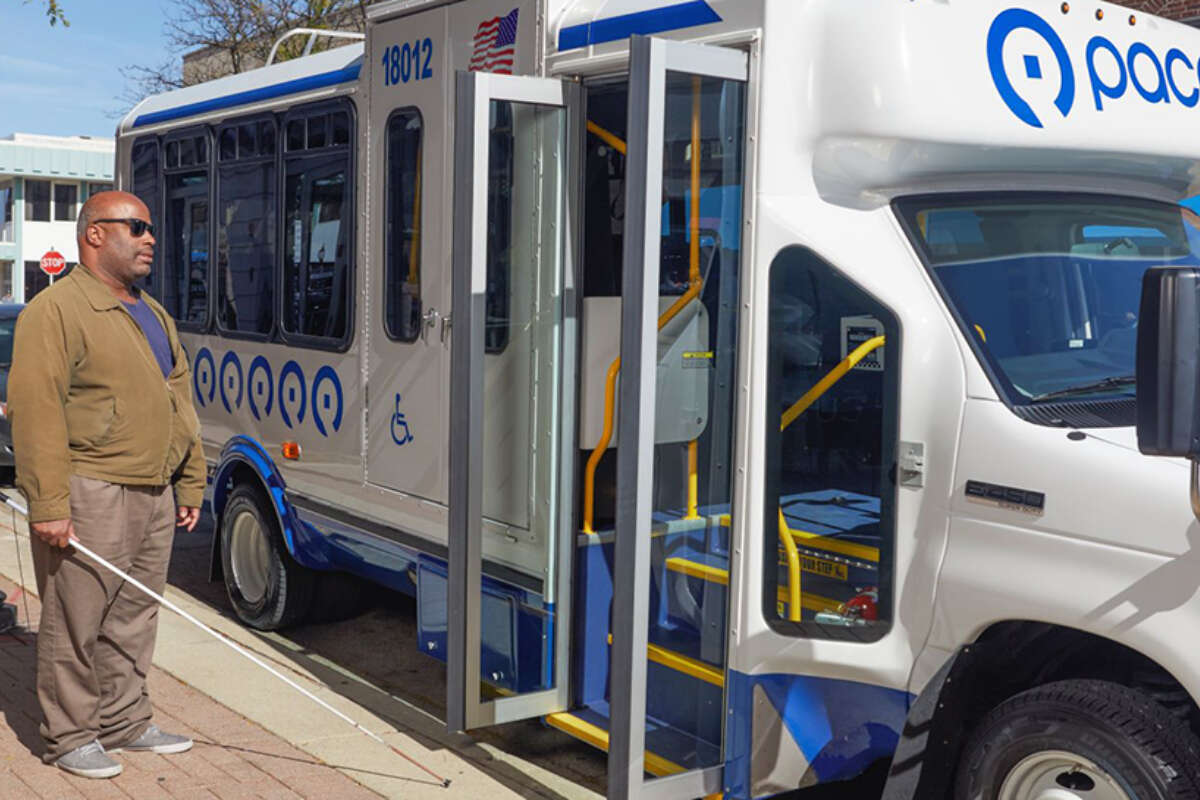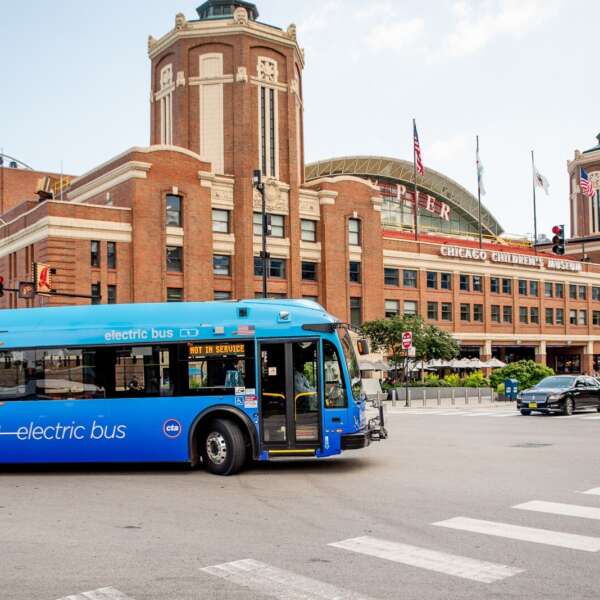MCRide dial-a-ride service provides access to McHenry County and beyond
August 10, 2022
August 10, 2022

This is part of our Moving You series, which examines federally funded programs managed by the RTA that expand transportation options and access for all.
Getting where you need to go without a car in McHenry County could seem challenging. Though there are multiple Metra stations and various Pace bus routes within county lines, people who are unable to drive—including some seniors, individuals with disabilities, and individuals experiencing low incomes—may have a hard time getting to those fixed-route transit services. That’s why Jon Paul Diipla, Transportation Planning Manager for the McHenry County Division of Transportation (MCDOT), and Jazmin Vega, MCDOT Transportation Planner, are passionate about getting the word out about MCRide.
The MCRide program provides coordinated, countywide dial-a-ride service to anyone who wants or needs it—even those who live outside of McHenry County. The service directly links to three Metra stations on two different lines, four Pace fixed routes, and eight other dial-a-ride services in adjacent counties. Rides are available from 6 a.m. to 7 p.m., seven days a week. Trips can be for any purpose, and the service covers all municipalities and townships within McHenry County and seven destinations outside of the county: Advocate Good Shepherd Hospital, Advocate Sherman Hospital, Chain O'Lakes State Park, Spring Hill Mall, the Barrington Metra Station, The Arboretum in South Barrington, and the Randall Oaks Zoo & Golf Course.
This year, the RTA will provide $1.4 million in federal funding to support MCRide through the Section 5310: Enhanced Mobility of Seniors and Individuals with Disabilities Program. This funding only supports trips for seniors and individuals with disabilities, not the general public rides that are also available.
MCRide expanded to countywide service in January 2021, the first of its kind in the Chicagoland area. Previously, the program was set up so that participating municipalities would provide a match in order to be included in the service area.
“That was the case for a number of years, and in looking at the data, it was determined that there was a need for an expanded service area, so the county decided a few years ago to provide the local contribution for the program,” Diipla said.
So far, the feedback has been positive. It was bold to launch the service in January 2021, in the throes of the COVID-19 pandemic and before vaccines were available to the general public. But even before the expansion, Diipla said MCRide ridership numbers were approaching pre-pandemic levels—an indicator of how important this dial-a-ride service is.
Cissy Pinkstaf, whose son, Joshua, has autism, began using MCRide in August 2021 as a participant of Project SEARCH, a job skills program for young adults with disabilities out of Woodstock Hospital. Cissy would drive him to the hospital in the morning, and he took MCRide home. Now, he continues to use it to get to work at CalCo Industries.
“We had a really good experience,” Cissy said. “Right away when I set everything up, I told them he had autism. They always were very in tune with keeping me updated on what was going on and were always willing to try to fit him in even if the schedule was full. We’ve had nothing but positive experiences.”
Mark Ehrlich’s son, Aaron, also used MCRide to get to Project SEARCH at the hospital, and he now has a job at Northwestern Hospital in Huntley. Mark is retired and is able to drive Aaron where he needs to go, but MCRide gives both of them independence and flexibility, and the service is trustworthy.
“Having a special needs child, it’s nice to have this service that you can trust,” he said, adding that Aaron will most likely use ride hail services like Uber or Lyft for certain trips once he’s more comfortable doing so. “But I don’t know who those drivers are, and he knows his Pace drivers. Trust is part of it for me.”
Graznya Krukowski Minior also has a child, Grace, who graduated from Project SEARCH and rode MCRide to get to the hospital from Wonder Lake. Grace, now 21, has been using MCRide for various trips since was 16. Graznya said dial-a-ride service like this is a lifeline for people who, for whatever reason, aren’t able to drive.
“People with disabilities often are not seen, are not heard, and transportation is a lifeline like food or electricity; it’s another very important lifeline to succeed and be a full-time human being,” Graznya said. “That kind of transportation should be everywhere.”
Ridership for MCRide continues to grow, and Diipla and his colleagues are focused on outreach efforts so that residents know the service is available to all.
“MCRide is open to the public; that’s something that makes us unique in comparison to other programs in the region,” Vega said. “I have riders call in needing some clarification as to whether they can use the service or not, and yes, everyone can use this. You don’t even need to live in McHenry County.”
Currently, MCRide is used most often for medical appointments and other essential trips for seniors and individuals with disabilities, but Vega said there’s no reason the program can’t expand and become widely known as a convenient, affordable transportation option for everyone.
“We’re looking forward to growing the service even more, as we can,” Diipla said, “and looking at enhanced services and coordinating with Pace on scheduling and other tech solutions to incorporate into the program. It’s an ever-evolving process, but I’d say overall we’ve received a lot of positive feedback.”
Whether riders use MCRide out of necessity or choice, dial-a-ride programs provide an important mobility solution, Vega said.
“Dial-a-ride offers a service to populations that might have unique and specific needs that fixed routes may not be able to address,” she said. “Working to make this program as accessible as possible for everyone in McHenry County, but also just promoting this service and educating people about dial-a-ride in general, is a priority of mine. There’s always room in this program to grow, and there’s a lot of opportunity—in terms of innovating payment methods, in terms of expansion points, and in terms of pursuing additional funding sources—to be able to make these expansions possible.”
Subscribe to our Newsletter
Related Articles
 How to navigate the Democratic National Convention using public transportation
How to navigate the Democratic National Convention using public transportation
The Democratic National Convention is coming to Chicago’s United Center and McCormick Place August 19-22, 2024, and with it will come roughly 50,000 visitors...
July 25, 2024 How to use transit to explore museums in the Chicago region
How to use transit to explore museums in the Chicago region
The Chicago region is home to countless accessible cultural and educational amenities including 150 museums across several counties. The most cost-effective ...
July 10, 2024 RTA welcomes summer 2024 interns
RTA welcomes summer 2024 interns
This summer the RTA welcomed six new interns from Chicago-area universities. The interns work in various departments including Communications, IT, Strategic ...
June 27, 2024 Four months into the Access Pilot Program, over 3,000 Metra riders experiencing low incomes enrolled for more affordable fares
Four months into the Access Pilot Program, over 3,000 Metra riders experiencing low incomes enrolled for more affordable fares
On February 1, RTA launched the Access Pilot Program in partnership with Cook County and Metra, extending reduced fares to eligible Metra riders experiencing...
June 13, 2024 How to use transit to celebrate Pride Month in the Chicago region
How to use transit to celebrate Pride Month in the Chicago region
June is Pride Month, a time to honor and celebrate Lesbian, Gay, Bisexual, Transgender, Queer and Questioning (LGBTQ+) individuals in the United States. The ...
May 31, 2024 How to use transit to enjoy summer in the Chicago region
How to use transit to enjoy summer in the Chicago region
Summer weather is here and although the season can feel short for many Chicago residents, there is no shortage of fun to be had. To celebrate the sunshine, t...
May 24, 2024